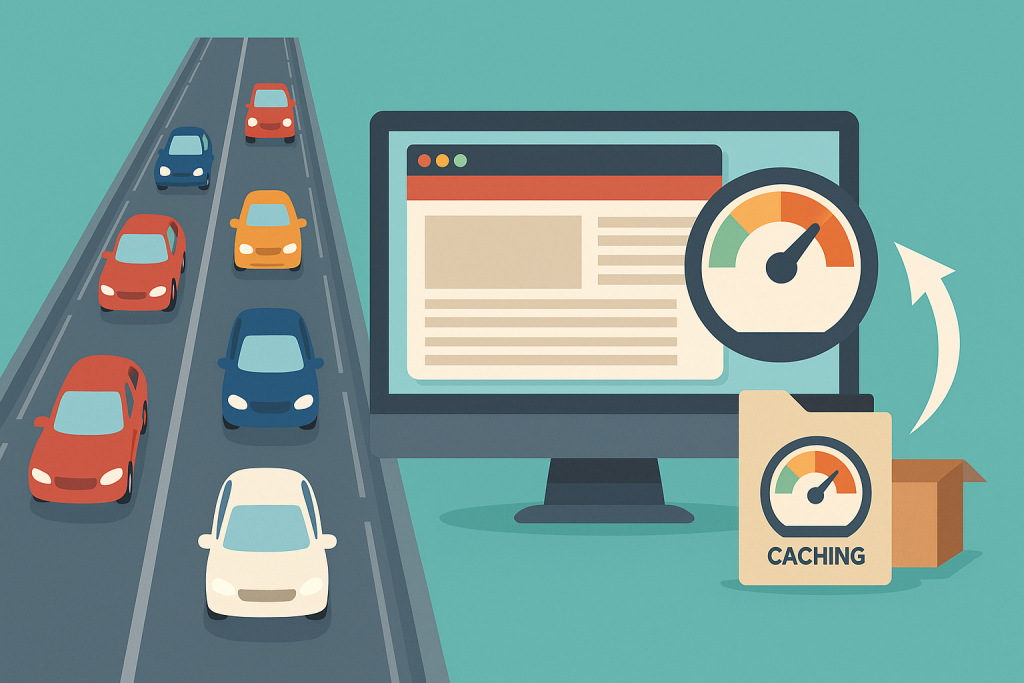Handling Rush Hour on Your Event Site
Think of your website as a road. On most days, it’s a quiet street with just a few cars and neighbors walking their dogs—that’s your usual traffic flow.
But when you announce ticket sales for your event, it turns into rush hour. Instead of commuters heading home, everyone tries to merge into your checkout lane simultaneously. If your “road” isn’t designed to handle this, you end up with a traffic jam—honking horns, frustrated drivers, and abandoned shopping carts. Slow loading times on your event page can frustrate users even more, causing them to abandon their carts before completing a purchase.
The good news is that, just like city planners manage traffic flow, you can prepare your Tickera-powered site to handle rush hour smoothly and avoid gridlock by ensuring each page can load quickly and efficiently, even under heavy traffic.
The anatomy of an online traffic jam
So, what actually causes the jam?
In real life, it’s too many cars cramming onto too few lanes. Online, it’s too many visitors asking your website to juggle too many tasks at once. Every buyer has a cart session, payment details need verifying, seats (if you’re using Seating Charts) need reserving in real time, and the server is trying to wave everyone through the toll booth simultaneously.
If your hosting is too limited, or your site is carrying too much “baggage” (like plugins you don’t really need), it’s the equivalent of having a two-lane road where you really needed a highway. The result? Bottlenecks, slowdowns, and in worst cases, crashes.
Smart caching: keeping the green lights flowing
Synchronized green lights keep city traffic moving smoothly. On your website, caching works similarly by serving pre-built “snapshots” of pages instead of generating them from scratch with every request. These cached pages are already loaded and ready to be served instantly to visitors.
However, you don’t want green lights everywhere. Imagine if an on-ramp to a highway was always green without any traffic control—chaos would ensue. The same goes for caching your cart or checkout pages; buyers might see outdated information, like tickets that have already sold out.
The solution is to cache static pages such as event details, homepage, and blog posts (the easy side streets), but exclude dynamic pages like cart, checkout, and seating charts. These pages require live updates to keep traffic flowing correctly. When done properly, caching reduces congestion without causing jams.

Hosting: widening your digital road
Even the best traffic lights can’t fix a narrow road. This is where your hosting choice is critical.
Shared hosting is like a quiet neighborhood street—fine for light traffic but inadequate for festival crowds. A VPS provides more lanes and better traffic flow. Managed WordPress hosting? That’s like having a dedicated team of traffic controllers who anticipate and fix jams before they happen. Managed WordPress hosting often makes it easy to install essential plugins and tools for event management, even for users with basic technical skills.
If you expect a surge of buyers at a specific launch time, investing in a robust hosting solution is the difference between smooth sailing and long queues of frustrated customers. Spending money on quality hosting is a worthwhile investment for event success.
Managing check-in traffic
So far, we’ve focused on the incoming traffic buying tickets. But once your event starts, there’s also outgoing traffic—ticket check-ins.
Every time a ticket is scanned with Checkinera, it sends a request to your site to verify and mark the ticket as used. With a small crowd, this isn’t noticeable. But thousands passing through multiple entrances can create jams if your server is already busy.
Checkinera allows offline scanning by downloading the attendee database, which works well for small events with a single entrance. However, for larger events with multiple gates, multiple locations, and devices, offline check-in can cause issues—tickets might be scanned multiple times before devices sync, like letting the same car pass through several exits. Managing attendee check-in often involves downloading and syncing files across devices to ensure accuracy and up-to-date ticket status.
The best practice? For big events with multiple gates, keep scanners online so ticket statuses update instantly across all devices. Again, strong hosting infrastructure is key to smoothly handling both ticket sales and check-in traffic.

Attendee experience and engagement: delighting your guests
Creating a memorable event isn’t just about smooth ticket sales—it’s about making every attendee feel valued from start to finish. The details that matter most to your guests—like a clear schedule, easy access to event information, and opportunities to connect—can transform a good event into a great one.
Don’t overlook the power of community and networking; building in spaces and moments for attendees to meet, share ideas, and collaborate can turn your event into a hub of energy and inspiration. And, of course, a well-chosen range of food and beverage options keeps everyone focused and energized throughout the day. By focusing on these key elements, you are encouraging positive word-of-mouth. This helps your event and your brand stand out in a crowded industry.
Leveraging a support team: your pit crew
When rush hour hits your event site, having a reliable support team is like having a skilled pit crew ready to jump into action. A strong support team can save you valuable time and help you stay focused on the big picture, even when last-minute changes or unexpected challenges arise. Whether it’s managing venue logistics, coordinating with sponsors, or handling ticketing details during peak hours, your support team ensures that every aspect of your event runs smoothly.
For example, experienced event coordinators can take charge of tasks like catering, audio-visual setup, and attendee check-ins. Delegating will free you up to concentrate on strategy and attendee engagement. When the event gets chaotic, your support team steps in to handle the details, troubleshoot issues, and keep everything on track. By investing in a dependable support crew, you can confidently navigate rush hour events, knowing that every detail is covered and your attendees—and sponsors—are in good hands.
Monitoring your site: your traffic cameras
Even the best roads need monitoring. Tools like UptimeRobot or Pingdom act as your website’s traffic cameras, alerting you immediately if something stalls or crashes. These tools display clear messages on your monitoring screen, making it easy to quickly identify and resolve any issues.
You can also check your site’s status on the go—WordPress works well on mobile browsers, letting you log in quickly if issues arise. Once Tickera is set up, much runs automatically: tickets are sent, QR codes generated, seating managed. Your job is to ensure no unexpected jams block the way.
Handling unexpected surges
If your event goes viral, congratulations! It’s like a parade flooding your street—overwhelming but exciting.
At this point, communication is crucial. If tickets sell out, a clear message should be presented to users on your site—no one wants to circle endlessly looking for parking that isn’t there.
And whatever you do, don’t try to change plugins or rebuild your site during peak sales. That’s like tearing up the road in the middle of rush hour—accidents are inevitable. Let the surge pass, then make improvements for next time.

Practice makes perfect: rehearsal drives
Cities don’t build intersections and hope for the best—they test them. You should, too. Thorough testing is essential to ensure your site can handle rush hour traffic and that everything works as expected.
A few days before sales launch, have friends or colleagues all visit your site simultaneously. Go through the cart, checkout, and payment steps. While it won’t perfectly simulate hundreds of users, it can reveal timing issues or bottlenecks.
Think of this as a rehearsal drive before opening your digital highway to festival traffic. For more tips, check out this guide.
Event evaluation and improvement: learning from every rush hour
Every rush hour on your event site is an opportunity to learn and improve. After the event, take time to gather feedback from attendees, sponsors, and participants. This can be as simple as a post-event survey or as detailed as a roundtable discussion. Use this input to identify what worked well and where there’s room for improvement. Whether it’s tweaking the schedule, enhancing content, or streamlining the check-in process.
Tracking key metrics like attendance, and revenue gives you a clear picture of your event’s success and highlights areas for growth. For example, if you notice a drop-off in participation during certain hours, you can adjust your schedule or content for next time. By making event evaluation a regular part of your process, you create a cycle of continuous improvement that keeps your events fresh, engaging, and ahead of the competition. This proactive approach ensures that every rush hour becomes a stepping stone to even greater success for your business and your community.
Wrapping it up
Traffic jams are frustrating whether on the road or at a spinning checkout wheel. But with the right preparation, your Tickera site can handle rush hour without breaking a sweat.
Success depends on three things:
- Wide enough “road” (good hosting)
- Well-timed “traffic lights” (smart caching)
- Clear path free of obstacles (lean plugins and themes)
Add monitoring tools and rehearsal tests, and your site will be ready for any rush. Maintaining focus and careful planning gives you a significant advantage over less-prepared competitors, ensuring your event runs smoothly and efficiently.
Next time your event announcement sends crowds rushing your way, you can relax knowing your digital highway is flowing smoothly. After all, the only line your attendees should complain about is the one for the bathrooms—not the checkout.